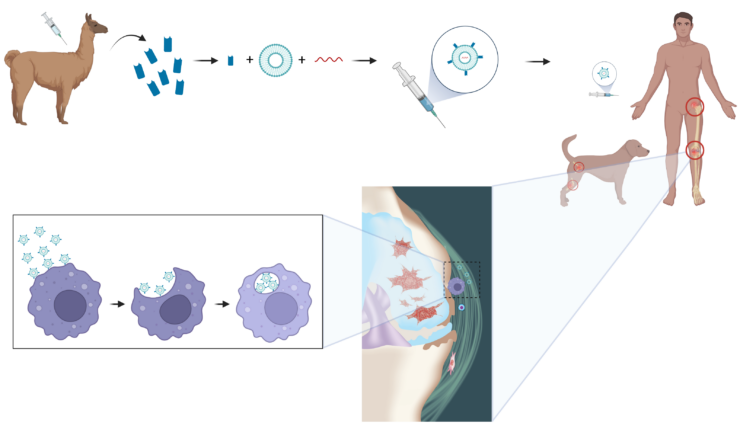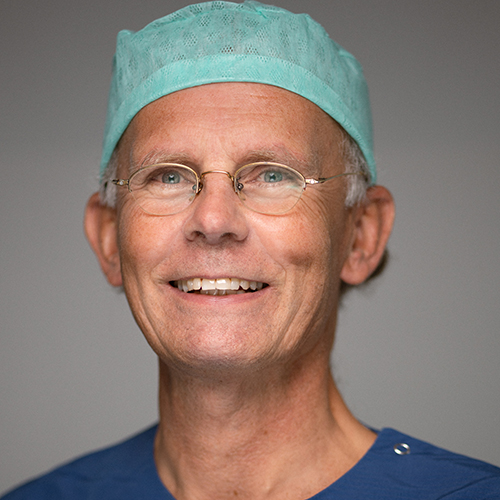Joint diseases such as osteoarthritis (OA) cause heavy burden and major loss of quality of life. OA has risen to 12th leading cause of years lived with disability (YLD) between 1990 and 2016 among 328 non-communicable global diseases. Long-term trend investigation on the prevalence of knee OA, demonstrated that it has doubled since the mid-20th century and is expected to rise further in the coming decades. Like in humans, spontaneous OA also occurs in veterinary patients (e.g., dogs), affecting their mobility and well being. Dog OA onset, progression, disease diagnosis, and treatment go along the same lines as in man.
Intra-articular injections allow for a local application using for instance biomaterials that enable controlled release of drugs biomolecules. Through a unique pre-clinical platform employing small animal models, and ultimately the veterinary patients suffering from osteoarthritis or back pain, we have been able to develop these strategies.
To feed these strategies with the appropriate biomolecules, we employ developmental biology and the divergence seen within the canine species to identify and validate regenerative targets by means of “omics”. Within this context, we also study how joint distraction facilitates intrinsic cartilage repair.
The OA-BIO project (2021 – May 2024) is a Eurostars project that proposes a novel disease modifying drug for OA, 4P-004, a new proprietary formulation of approved incretin mimetic (a Glucagon-Like Peptide-1 receptor agonist) Liraglutide for intra-articular administration. The game-changing treatment has a unique triple effect: anti-inflammation, anti-pain and cartilage regeneration; offering the first curative OA therapy. In this project, new OA imaging and liquid biopsy biomarkers (e.g. blood, urine and synovial fluid) will be validated. Moreover, different OA models will be used to monitor treatment response (efficacy) by measuring these OA-biomarkers during and after inducing OA related tissue responses.
The VHH-MARS project (VHH-Mediated tARgeting of osteoarthritic Synovium; 2023-2027) is a public-private partnership funded by ReumaNederland and Top Sector Life Sciences & Health (LSH; Health~Holland). For the project, Utrecht University, Orthros Medical, and University of Twente join forces to develop a drug delivery platform to deliver RNA therapeutics in a targeted manner for the eventual treatment of inflamed joints, an important hallmark of the disease osteoarthritis.
In this project, we will develop a drug delivery platform, that guides RNA into inflamed joint membrane cells, the location where inflammation and pain originate. It is expected that with this local treatment, joint inflammation can be treated and consequently, pain is reduced.
Treating osteoarthritis with a targeted and sustainable approach has a major social-economic impact. When oral medications fail, joint replacement surgery is often the only and last solution. The platform that will be developed will be of great advantage for patients who are not yet eligible for a surgical solution, which can even be postponed or prevented.


The Centre for Animal-Free Biomedical Translation (CPBT, in Dutch: Centrum voor Proefdiervrije Biomedische Translatie; 2025 – 2034) project is funded by the National Growth Funds and aims to accelerate the transition to animal-free biomedical innovations. This will offer economic and social benefits with improved medicines and less animal testing. Together with a large number of national and international partners, the CPBT will work on the development and dissemination of animal-free biomedical innovations and expertise.
The initial Transition Projects will focus on ALS, cystic fibrosis, osteoarthritis & Rheumatoid Artritis, and asthma & COPD. The CPBT will implement the available and developed methods, tools, and expertise together with researchers and companies.
The regenerative orthopedics group will lead and co-lead work packages within the transition project Osteoarthritis & Rheumatic Diseases. Read more on the website of the CPBT here >>
Involved researchers











